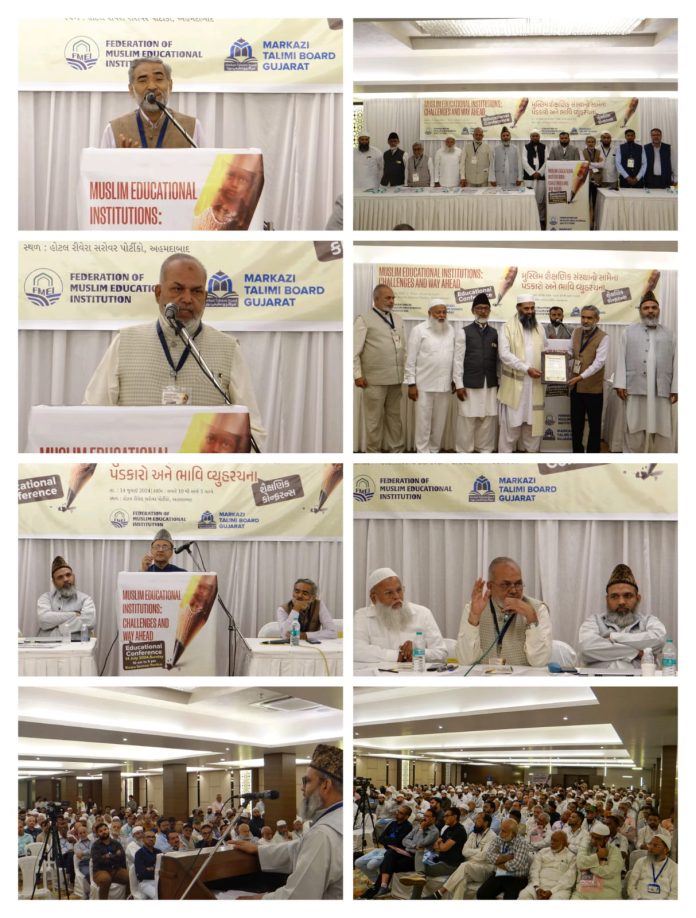Ahmedabad, July 17: A state-level educational conference, organized by the Federation of Muslim Educational Institutions (FEMII) and the Central Educational Board, Gujarat Chapter, took place at the Hotel Rivera Sarovar Portico here on July 14. The central theme of the conference was “Challenges Facing Muslim Educational Institutions and Future Strategies.”
The event saw participation from approximately 400 delegates, including administrators and officials from renowned Muslim minority educational institutions, Islamic school administrators, and education professionals from various districts of Gujarat. The conference featured scholarly discussions from national education experts and scholars on diverse topics.
The conference began with a recitation from the Holy Quran, followed by a welcoming address from Dr. Mohammad Salim Pattiwala, Amir Jamaat-e-Islami Hind, Gujarat. He acknowledged the current challenges faced by the Muslim community but expressed optimism about its progress.
Dr. Iftikhar Malik, President of the Central Educational Board, Gujarat Chapter, explained the conference’s purpose, emphasizing the need for collaborative efforts to achieve educational transformation within the Muslim community.
The first session featured Prof. Akhtarul Wasey (former President, Maulana Azad University, Jodhpur) and Mujeebur Rahman Ateeq Nadwi (Nazim Talimat, Darul Uloom Imam Rabbani, Neral, Maharashtra), who highlighted the significance of education in Islam. They stressed bridging the gap between religious and secular education to provide students with comprehensive knowledge.
Mujtaba Farooq (Trustee, Central Educational Board) detailed the government’s adversarial policies towards minority educational institutions, particularly criticizing the government’s treatment of madrasas. He urged the Muslim community to understand their constitutional rights and work towards educational advancement.
Dr. Maulana Mohiuddin Ghazi (National Secretary, JIH), presiding over the first session, addressed the need for madrasas to align with modern sciences and technology, stressing the importance of integrating traditional religious teachings with contemporary knowledge to guide humanity effectively.
The second session included a panel discussion on the impacts of the National Education Policy (NEP 2020) on minority institutions. Participants included Zubair Gopulani (Director, Hanifa School and Trustee, Islamic Study Centre), Afzal Memon (President, Gujarat Sarojan Welfare Trust), Prof. Dr. Aqil Ali Syed (Vice Chancellor, GM Vastanvi University, proposed), Mufti Sajid Belem Falahi (President, Street Path Foundation), and Shakeel Ahmed Rajput (President, Radiance Educational and Welfare Trust). The discussion highlighted both positive aspects and concerns of NEP, urging the government to address minority community needs in its implementation.
Dr. Syed Zafar Mahmood (Retired IRS and President, Zakat Foundation of India) emphasized increasing Muslim representation in bureaucracy and administrative positions. He suggested utilizing mosques and community halls for educational purposes.
Dr. Abdul Qadeer (Chairman, Shaheen Foundation, Karnataka) encouraged current administrators by sharing the success story of Shaheen Foundation, which has helped numerous students gain admission to government medical colleges. He urged the community to prioritize educational expenditure over unnecessary spending.
Syed Tanveer Ahmed, President of the Central Training Board, in his keynote address, defined education as a transformative tool for personality development, not merely information transfer. He advocated for a holistic approach to education and professional management of educational institutions. He called for the development of Muslim education experts to influence policy-making and stressed collaborative efforts for spreading education within the Muslim community.
The conference saw a strong demand from minority educational institutions for the reinstatement of the Maulana Azad Pre-Matric Scholarship. During the event, Advocate Tahir Hakeem was honored with a memento and shawl for his legal contributions to FEMII, Gujarat Chapter.
The conference concluded with the presentation of resolutions by Convenor Arshad Hussain Sheikh and a vote of thanks by Wasef Hussain Sheikh, Secretary, Jamaat-e-Islami Hind, Gujarat. Participants expressed positive feedback and called for the continuation of such programs in the future.




